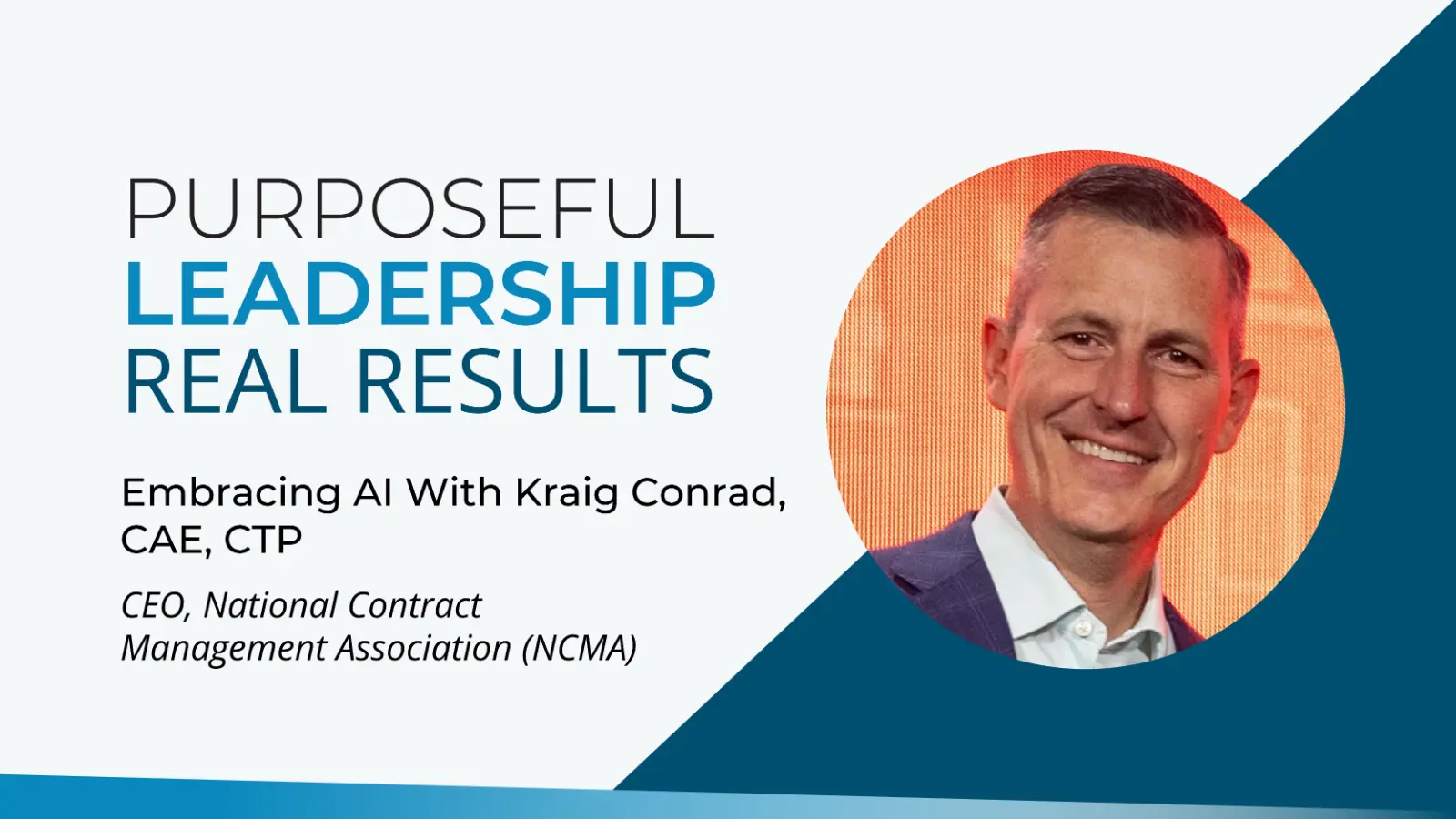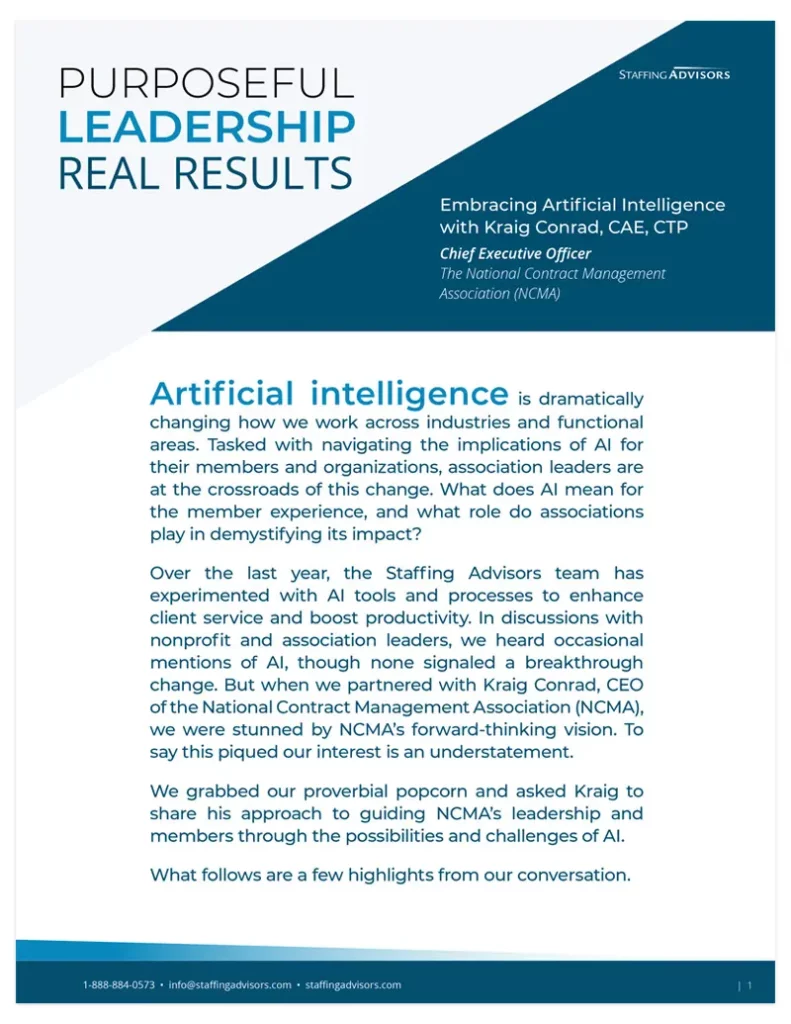Artificial intelligence (AI) is dramatically changing how we work across industries and functional areas. Tasked with navigating the implications of AI for their members and organizations, association leaders are at the crossroads of this change. What does AI mean for the member experience, and what role do associations play in demystifying its impact?
Over the last year, the Staffing Advisors team has experimented with AI tools and processes to enhance client service and boost productivity. In discussions with nonprofit and association leaders, we heard occasional mentions of AI, though none signaled a breakthrough change. But when we partnered with Kraig Conrad, CEO of the National Contract Management Association (NCMA), we were stunned by NCMA’s forward-thinking vision. To say this piqued our interest is an understatement.
We grabbed our proverbial popcorn and asked Kraig to share his approach to guiding NCMA’s leadership and members through the possibilities and challenges of AI. What follows are a few highlights from our conversation.
Show, Don’t Tell
In February 2023, NCMA published Contract Management Magazine with the cover story, “AI Is Coming for Contracting.” When Editor-in-Chief Anne Laurent shared the article on social media, it went viral. And largely unbeknownst to readers, it was written by ChatGPT.
NCMA’s publishing team didn’t just talk about the potential of generative AI—they demonstrated it, creating shockwaves among readers. This audacious move underscored the transformative capabilities of AI in contracting and beyond, emphasizing that while AI might not replace human contracting professionals, it will most certainly redefine their roles and change the profession.
At the time of the article’s publishing, Open AI had just released ChatGPT a few months prior, and the world saw an explosion of AI and machine learning. Since then, industries have grappled with how to leverage the benefits of these technologies while putting guardrails in place to protect privacy and reputation.
With Kraig at the helm, NCMA is taking a systematic approach designed to move at the pace of change while keeping the profession’s needs central to all decision-making.
As a leader of a professional society with a focused practice area, you should always be listening, paying attention to what’s happening, and taking a proactive approach. How will AI impact the practice? What is its application now or perceived application? What are the challenges ahead?
Shaping the Vision of AI for NCMA
Recognizing AI’s growing influence on contract management, Kraig didn’t wait for others to start the AI conversation. He took bold steps to stay ahead of the curve and explore the potential benefits for NCMA and its members.
Kraig shared that he may have initially moved too quickly without enough preparation for the Board and key stakeholders. But he course-corrected and has proven incredibly successful in moving NCMA forward. If Kraig’s approach could be summarized in one word, it’s proactive. He’s pushing boundaries, and it’s working.
How will people train for our practice in four or five years? How will someone get hired? The reality is that it keeps changing. And it’s going to keep changing before we start to see what the future of it all could look like. I don’t want NCMA and our members to be run over by that. We want to be the ones ready for that.
Kraig’s methodology is highly iterative, evaluating outcomes, refining, and adjusting at each step. In a sense, NCMA’s process mirrors how AI technologies evolve: always progressing but changing shape as new data and technologies become available. A simplified version of his approach could be described as a cycle of three stages: educate stakeholders, develop use cases and identify risks, and pilot and test.
Educating Key Stakeholders
Kraig understood that to talk productively about AI, he had a responsibility to help the Board see the scope of potential implications. Kraig invited Jason Schenker, Chairman of The Futurist Institute and the President of Prestige Economics, to join the Board at their July meeting to discuss what an AI-driven future might look like and how to prepare NCMA for it.
He also brought in a voice from the practice. He invited Assistant Professor in the Department of Defense Management at the Naval Postgraduate School, Lt. Col. Daniel J Finkenstadt, Ph.D., to advise and show the Board how AI could actually change contract management work.
As with anything that could impact the practice, it’s my job to help the Board see where AI could go. So we brought in folks that have these big think mindsets to really get a sense of what this thing can do specific to our practice area. And not just what it’s doing now, but what it could be in the future.
With this foundation of practical and theoretical information, the Board began thinking about real-world applications and assigned oversight of AI initiatives to the Audit and Risk Committee. Although Kraig remains the “Chief AI Explorer,” he carefully leverages the Board’s and external expertise to ensure NCMA’s strategy aligns with the profession’s best interests.
As NCMA works through applications of AI, Kraig notes that it is critical to keep looking forward and balance Board time appropriately. He facilitates checkpoints throughout the year to help the Board step back and think about what’s next. What will NCMA and the practice need in five years or even ten?
Developing Use Cases and Identifying Risks
Kraig and the Committee then collaborated to identify and prioritize various AI use cases for NCMA, considering their relevance and potential impact, including:
- AI-assisted search to improve member engagement and customer service
- An AI community forum for members
- AI for user engagement with content
- Staff use of AI for content generation and editing
- AI-powered training and education models
- Using AI to harmonize job tasks to get to the global standard
Because of the rapid nature of AI development, every few weeks there is an update that impacts the practice. Kraig, the Audit and Risk Committee, and the advisory team meet to discuss the new information and reassess to address more pressing needs in the profession. Flexibility is key.
Our Audit and Risk Committee meets monthly, but more frequently if needed. For example, when I introduced a new use case, we collaborated with Dan Finkenstadt to demonstrate it … We always ask, ‘Do we have the right policies and training? Do we have the right backstops, insurance, etc.? From the Board, users, staff, and operating perspectives, do we have everything we need?’
Piloting and Testing
Kraig and the Board agreed to implement the first use case, AI-assisted search, and will roll it out early in 2024. Kraig refers to this as the first level of customer service, a way to efficiently respond to member inquiries that don’t require personal intervention.
The goal is to give users the most relevant and helpful information about NCMA’s content and programs. In the future, it may also help to answer broader questions about contract management practice.
It is AI-assisted search, but it’s really bigger than customer service—it’s a chatbot that allows people to have a dialogue with us. It’s trained with our content, program descriptions, and FAQs and always provides references. A member can ask a question, and the bot offers both generative answers and citations.
After NCMA has kicked every tire internally, they plan to release AI-assisted search to the community for beta testing so members can offer feedback about what does and doesn’t work. When NCMA implements it fully, Kraig and his team will have taken every step to ensure its safety, accuracy, reliability, and practical value.
Up next for implementation is a community platform for members to share their experiences with AI and how they are developing AI programs, prompts, and policies in their organizations. Access to reputable information is a large part of what attracts members to NCMA. This forum will strengthen the member value proposition further.
Bridging the Gap to Advance the Profession
In this highly regulated industry, the Federal Government is encouraging contract management professionals to explore and experiment with AI, but not with real-world data or scenarios that could show how AI might impact their work. NCMA’s initiatives promise to bridge that gap. Kraig and the NCMA Board aren’t just preparing for the future; they’re actively building it, ensuring that NCMA and its members remain at the forefront of the contract management profession in an increasingly AI-driven world.
AI is a powerful tool, not just for the practice that our members do but for how we deliver value to them. Our responsibility—how we bring it into our work and the work we do on behalf of the community—is just beginning.
Take It With You
Download a PDF of this article to share with your team (no email or signup required).
Behind the Curtain: AI Tools Used for This Article
Staffing Advisors’ conversation with Kraig was recorded and transcribed by the AI notetaking service Fireflies.ai, which also provided a summary of key points. Fireflies is a paid service that uses industry-grade security to protect customer data.
Using these key points as a general outline, our communications manager wrote the article and used ChatGPT and Grammarly to refine and edit. To protect the privacy of the interview, we replaced any mention of NCMA or Kraig Conrad with placeholder names before uploading anything to ChatGPT and turned off the chat history setting.
ChatGPT prompts we used include:
- Please review this article and provide suggestions to make it more concise and clearer for a business audience. Provide a bulleted list of suggestions followed by a new draft, keeping the same tone, style, and key points. [insert first draft]
- I used some of your suggestions in a new draft. Please review. Are there any ways to improve it further? Provide a bulleted list of suggestions. Do not rewrite the draft. [insert second draft]
One of the phrases ChatGPT offered was plagiarized from a source on the web, which Grammarly caught.
Related Resources
- For more innovative ideas in association and nonprofit leadership, check out CEO Francesca Dea’s approach to managing a remote team and building a culture that thrives in ambiguity at the Society for Cardiovascular Angiography & Interventions.
- For a guide to making your work sample tests and interviews more effective in an AI-driven world, read How to Chat-GPT Proof Your Work Sample Tests.
- For a peek at our May 2023 perspective on AI and hiring, read How Much Can AI Improve Hiring, Really?

